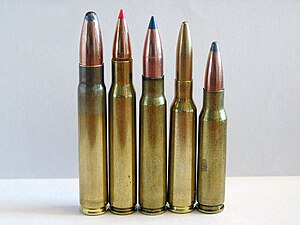7.92×57mm
| 7.92×57mm Mauser | ||||||||||||||||||||
|---|---|---|---|---|---|---|---|---|---|---|---|---|---|---|---|---|---|---|---|---|

From left to right 9.3×62mm, .30-06 Springfield, 7.92×57mm Mauser, 6.5×55mm and .308 Winchester cartridges
|
||||||||||||||||||||
| Type | Rifle | |||||||||||||||||||
| Place of origin | German Empire | |||||||||||||||||||
| Service history | ||||||||||||||||||||
| In service | 1905–present | |||||||||||||||||||
| Used by | Germany, United Kingdom, Spain, Czechoslovakia, Poland, China, Dominican Republic, Yugoslavia, Ottoman Empire, Turkey, Iran, Egypt, and many other countries | |||||||||||||||||||
| Wars |
World War I, World War II and numerous others |
|||||||||||||||||||
| Production history | ||||||||||||||||||||
| Designer | German Rifle Testing Commission | |||||||||||||||||||
| Designed | 1903/1905 | |||||||||||||||||||
| Produced | 1888–present | |||||||||||||||||||
| Variants | 8×57mm IRS (rimmed) | |||||||||||||||||||
| Specifications | ||||||||||||||||||||
| Parent case | M/88 | |||||||||||||||||||
| Case type | Rimless, bottleneck | |||||||||||||||||||
| Bullet diameter | 8.22 mm (0.324 in) | |||||||||||||||||||
| Neck diameter | 9.08 mm (0.357 in) | |||||||||||||||||||
| Shoulder diameter | 10.95 mm (0.431 in) | |||||||||||||||||||
| Base diameter | 11.94 mm (0.470 in) | |||||||||||||||||||
| Rim diameter | 11.95 mm (0.470 in) | |||||||||||||||||||
| Rim thickness | 1.30 mm (0.051 in) | |||||||||||||||||||
| Case length | 57.00 mm (2.244 in) | |||||||||||||||||||
| Overall length | 82.00 mm (3.228 in) | |||||||||||||||||||
| Case capacity | 4.09 cm3 (63.1 gr H2O) | |||||||||||||||||||
| Rifling twist | 240 mm (1 in 9.45 in) | |||||||||||||||||||
| Primer type | Large rifle | |||||||||||||||||||
| Maximum pressure (C.I.P.) | 390.0 MPa (56,560 psi) | |||||||||||||||||||
| Maximum pressure (SAAMI) | 241.3 MPa (35,000 psi) | |||||||||||||||||||
| Ballistic performance | ||||||||||||||||||||
|
||||||||||||||||||||
|
Test barrel length: 600 mm (23.62 in) Source(s): RWS / RUAG Ammotech |
||||||||||||||||||||
The 7.92×57mm Mauser (designated as the 8mm Mauser or 8×57mm by the SAAMI and 8 × 57 IS by the C.I.P.) is a rimless bottlenecked rifle cartridge. The 7.92×57mm Mauser cartridge was adopted by the German Empire in 1905, and was the German service cartridge in both World Wars. In its day, the 7.92×57mm Mauser cartridge was one of the world’s most popular military cartridges. In the 21st century it is still a popular sport and hunting cartridge that is factory-produced in Europe and the United States.
The parent cartridge on which the 7.92×57mm Mauser is based was adopted by Germany in 1888 as the Patrone 88 (cartridge 88) or M/88 (along with the Gewehr 1888 service rifle). The M/88 cartridge was loaded with 2.75 g (42.4 gr) single-base (based on nitrocellulose) smokeless powder and a relatively heavy 14.7 grams (227 gr) round-nosed ball cartridge with a diameter of 8.08 mm (0.318 in). It was designed by the German Gewehr-Prüfungskommission (G.P.K.) (Rifle Testing Commission). The M/88 bore originally had 7.90 mm (0.311 in) lands diameter and 8.10 mm (0.319 in) grooves diameter. The M/88 barrel bore specification was changed by 1894/1895 to 7.90 mm (0.311 in) lands diameter and 8.20 mm (0.323 in) grooves diameter to improve accuracy and reduce barrel wear in M/88 chambered arms.
German government driven efforts to further improve on the performance of the military M/88 ammunition and the service arms in which the M/88 was used after several development steps eventually resulted in the official adaptation on 3 April 1903 by the Gewehr-Prüfungskommission of the dimensionally redesigned 7.92×57mm Mauser chambering. Besides the chambering, the bore (designated as "S-bore") was also dimensionally redesigned. The 1903 pattern 7.92×57mm Mauser S Patrone (S ball cartridge) was loaded with a lighter 9.9 grams (153 gr), pointed Spitzgeschoß (spitzer bullet) of 8.2 mm (0.323 in) diameter and more powerful double-base (based on nitrocellulose and nitroglycerin) smokeless powder. With the improved ballistic coefficient of the new spitzer bullet, the 1903 pattern cartridge had an improved maximum effective range and a flatter trajectory, and was therefore less critical of range estimation compared to the M/88 cartridge.
...
Wikipedia
